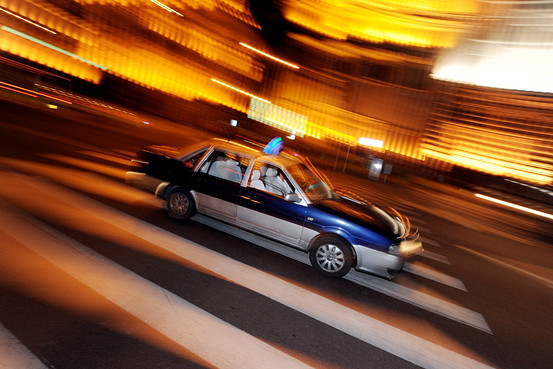Home -> News -> Media -> Shanghai Bans Taxi Apps During Rush Hour
Shanghai Bans Taxi Apps During Rush Hour

Taxi-hailing apps just got a little less useful in Shanghai.
The city on late Wednesday announced new rules to curb the use of such apps at peak times. The Shanghai Municipal Transport and Port Authority said in a notice on its website that such apps will be banned during rush hour, defined as between 7:30 and 9:30 a.m. and 4:30 to 6:30 p.m.
Cab drivers will also be prohibited from answering their phones or using apps while driving to ensure passengers safety, the authority said. The measures take effect Saturday.
The authority says drivers distracted by monitoring cellphones and apps pose a danger to customers. It blamed the apps for affecting “fair and just” market order and “hurting the civilized image the city’s taxi industry has nurtured.” The authority’s spokesman wasn’t immediately available for further comment Thursday.
China’s Internet industry has produced a slew of apps over the past few years to deal with the frustrations of hailing a taxi in many parts of China. The market leaders are Didi Dache, or “Honk Honk Catch a Cab” in Chinese, and Kuaidi Dache, a play on words that means, roughly, “Express Taxi.” both of which connect passengers with drivers to haggle over the ultimate fare. E-commerce giant Alibaba has invested at least $8 million in Kuaidi Dache, while Internet games-and-chat provider Tencent has invested an undisclosed amount in Didi Dache.
Didi Dache said in a statement on Thursday that the company had been in talks with the Shanghai authority and “will be integrated with the government’s platform in the near term.”Kuaidi Dache wasn’t immediately available for comment.
Uber, the car-hailing app that is growing fast in the West and which officially launched in Shanghai, Shenzhen and Guangzhou earlier this month, declined to comment. In an earlier interview, company executives said Uber doesn’t consider itself a taxi app because it works with private-hire car firms, not taxi companies.
Taxi apps have skyrocketed in popularity because it can be difficult to catch a cab in many of China’s cities, especially at peak times. But it has also led to complaints that getting a cab on the street has become more difficult as many drivers now refuse to pick up customers paying normal fares.
The apps allow users to bid for cabs by paying the regular taxi fare, plus an additional tip, usually five to 10 yuan (about $1.6),which comes at the expense of the cab companies providing dispatch services to the taxis. The apps essentially allow riders to skirt local government limits on taxi fares and other cab-related codes—measures government officials say are there to ensure citizens can get affordable rides.
Beijing’s population nearly doubled between 1994 and 2011—from about 11 million to 20 million—yet the government added just 6,000 official taxis to the total of 60,000 licensed to be on the road at the beginning of that period, according to city figures. Shanghai had about 50,000 licensed taxis on the road as of the end of 2013 for 24 million residents.
Andreas Graef of management-consulting firm A.T. Kearney said government limits on fares in many cities reduce driver earnings, and thus supply of those willing to do the job. Other restrictions also stem taxi fleet growth.
Guo Hongfei, who has been driving taxis since 2001, said he has been able to earn several hundred extra yuan a day using the new taxi apps.
A user of both Didi Dache and Kuaidi Dache, he expects the rush-hour ban to affect this business. “The biggest benefit to drivers is that the apps can show us where passengers are going. Generally we don’t want to traffic busy areas.”
The Shanghai transport authority will meet representatives from Didi and Kuaidi on Thursday—the second time in three weeks—to push them to cooperate with taxi dispatch centers run by the city’s four major taxi companies. The authority said one development it hopes to introduce is for cabs to display an “occupied” light once they’ve been booked by a taxi app.
- .U.S. Treasury looks to hold more cash to deal with future crises
- .Yum, McDonald's in Shanghai food safety investigation
- .Yellen defends loose Fed policy, says job market still too weak
- .Carl Icahn says 'time to be cautious' on U.S. stocks
- .Samsung Electronics says second quarter profit likely down 24.5 percent; worst in two years
- .U.S. jobs data seen reinforcing strong growth outlook
- .Asia stocks up on buoyant Wall Street, oil near highs

